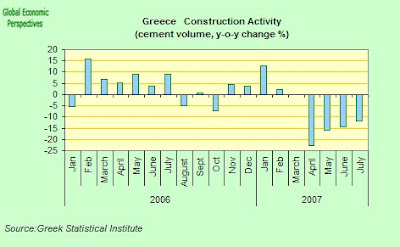The Greek government on Monday unveiled its 2008 draft budget, which aims to cut its deficit to 1.7 per cent of gross domestic product in an attempt to balance its public finances by 2010. Eurostat is reported to be near to large a big upward revision in the valuation of Greek GDP by 20 per cent or more. The effect of this will be to drive down the 2008 budget deficit-to-GDP ratio considerably.
The draft budget did not contain any big surprises. It counts on a projected double-digit increase in tax revenues and a smaller rise in expenditures to bring the general government budget deficit below 2 per cent of GDP in 2008 from an estimated 2.5 per cent this year.
This year’s budget deficit goal was set at 2.4 per cent of GDP, but spending overruns related to the destruction caused by the summer’s forest fires and the cost of general elections pushed it up to 2.5 per cent.
George Alogoskoufis, finance minister, told reporters the initial estimate for the direct cost of the fires on the 2007 budget was €300m (£209m, $428m), but this figure is expected to rise further.
The big question is what is now likely to happen to future Greek GDP growth? The government forecast is for the economy to grow by 4 per cent next year and by an anticipated 4.1 per cent this year following the 4.3 per cent recorded in 2006.
But there must be significant downside risk on all this in the current global and European climate. Especially given the dependence of the Greek economy on construction and its vulnerability to any global slowdown in the demand for shipping services, so all of this now needs to be watched carefully.

















